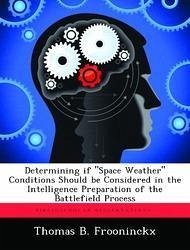
Determining If Space Weather Conditions Should Be Considered in the Intelligence Preparation of the Battlefield Process
Versandkostenfrei!
Versandfertig in über 4 Wochen
59,99 €
inkl. MwSt.

PAYBACK Punkte
30 °P sammeln!
This study investigates whether or not space environmental conditions, commonly referred to as space weather, should be considered in Army Intelligence Preparation of the Battlefield (IPB). Space weather refers to a variety of naturally occurring phenomena involving electromagnetic radiation, electrically charged particles, and the earth's upper atmosphere and magnetic field. IPB includes a process in which military decision makers evaluate the environmental conditions and consider the expected impacts on friendly and enemy operations. The study identifies a number of Army systems that are adv...
This study investigates whether or not space environmental conditions, commonly referred to as space weather, should be considered in Army Intelligence Preparation of the Battlefield (IPB). Space weather refers to a variety of naturally occurring phenomena involving electromagnetic radiation, electrically charged particles, and the earth's upper atmosphere and magnetic field. IPB includes a process in which military decision makers evaluate the environmental conditions and consider the expected impacts on friendly and enemy operations. The study identifies a number of Army systems that are adversely affected by space weather. These systems are used at all echelons by combat arms and combat support units for communications, intelligence collection and dissemination, electronic attack, and a number of navigation applications. The study discusses how the Army uses the systems and then identifies potential mission impacts and failures due to the effects of space weather. In determining the utility of space weather information as part of IPB, the study presents examples of how commanders and system operators could use space weather information to mitigate the adverse effects. The study concludes that space weather conditions should be formally considered during IPB.












